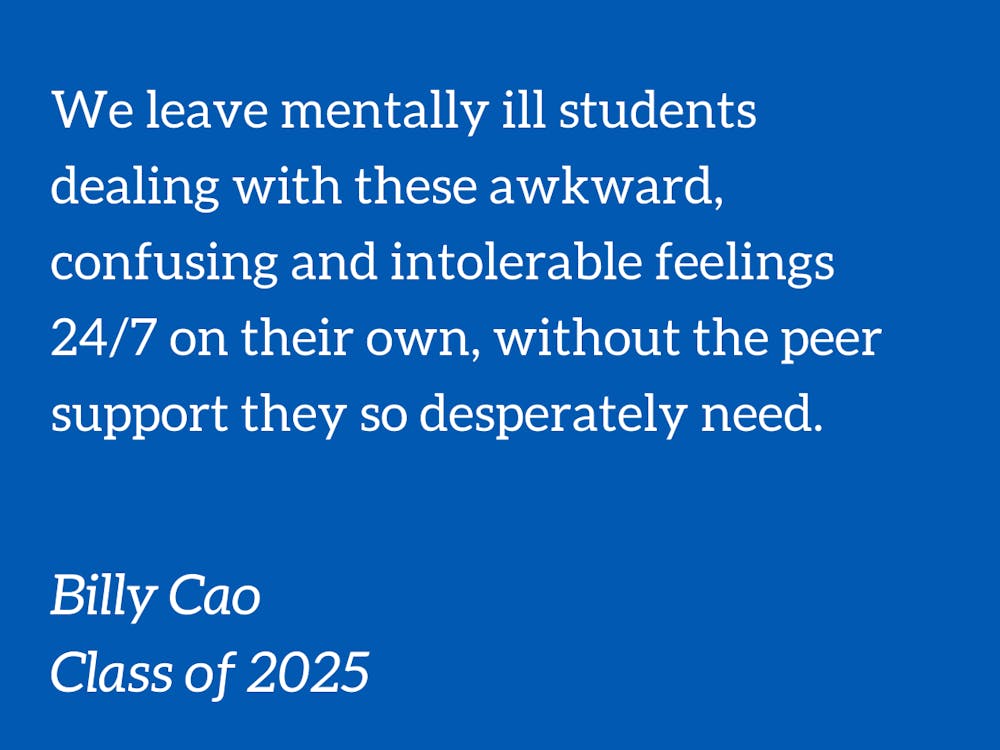Editor's note: This piece contains references to self-harm, suicidal ideation and other mental health concerns.
The problems had started during my first semester at Duke, shortly after my eighteenth birthday. It was dizzying mood swings at first, which my friends and I attributed to my “emotional sensitivity.” But then came a storm of impulsive outbursts, black-and-white thinking, identity disturbance and episodes of paranoia. Soon, I was swallowed whole by my own mind and locked away in a psychiatric facility one hundred miles from Duke.
My case confused the psychiatrist, who was unable to make sense of the motivation behind my destructive actions. “You said you felt like a burden to your friends.” She exuded an air of nonchalance, and her mouth formed a pensive frown. “Is there any evidence for that?”
No, there was not—it was all in my head. I was, and still am, suffering from borderline personality disorder, a condition that causes psychotic-like episodes of distorted thinking on a daily basis. All of that was concealed by the outward projection that I had everything figured out, evidenced by late-night study sessions, a 5.0 credit course load and a thriving research project at a biology lab.
I am not alone in my struggles. I have met many people at Duke whose remarkable accomplishments have not saved them from their mental health struggles. The pressure to constantly achieve merely worsens their sense of isolation. They suffer from eating disorders, OCD, bipolar disorder, self-harming behaviors, suicidal thoughts and other conditions people are reluctant to talk about because these topics make them uncomfortable.
My point is this: our mental health discourse is predicated upon a sense of Otherness that fetishizes outward presentation while invalidating lived experiences.
There are many ways that this Otherness manifests itself. By over-emphasizing the neurological or biological causes of mental illnesses, we become convinced that we are immune to significant psychological distress, thereby distancing ourselves from students who are undergoing such distress “for no apparent reason.” Of greater significance is our implicit tendency to place undue blame on the individual even if there are established biological bases for their conditions.
At its core, the act of Othering is a highly effective, yet unjustified, practice aimed to afford the student body protection from psychological harm. It is awkward, confusing and intolerable to address or even imagine the inner experiences of those dealing with mental illnesses so much so that we regard these discussions as socially unacceptable and label those who do discuss their very real struggles as “needy” and “attention-seeking.”
So we start to talk about mental health solely as something that is easily solvable by changing behavior. “You should try to exercise more so that you can get some motivation,” we tell our depressed friend who struggles to get out of bed every day; “have you tried things other than cutting yourself?” we ask our hallmate who uses self-harm to as a last resort to regulate their emotions; “you should be less dramatic,” we solemnly tell our peer who fights a personality disorder.
All of this when we leave mentally ill students dealing with these awkward, confusing and intolerable feelings 24/7 on their own, without the peer support they so desperately need.
Therefore, if we think of the current mental health discourse as a means to reduce the stigma, then the discourse has failed miserably. These anti-stigma efforts are themselves stigmatizing.
But these topics need not be suppressed at Duke, and compassionate peer support need not be supplanted by blindly optimistic advice and empty talks of “self-care.” Genuine efforts must be made to eradicate the epidemic of unbearable guilt and shame faced by those with mental health conditions.
These visions may sound achievable, but I cannot help wondering if I am asking too much. After all, our current, meaningless discourse is so deeply entrenched in our very own community. It is an agonizing realization to come to because in so many instances, all we need in order for us to reach out for help (through CAPS, for example) is one supportive friend who is willing and able to become the source of compassion and validation in our most vulnerable moments.
Until then, we will continue to see the exacerbation of mental health issues among Duke students, wondering what we could have done to support those who are suffering, all while failing to acknowledge mental illnesses for what they are, namely, mental struggles that wreak havoc on the emotional wellbeing of those experiencing them.
If you are in suicidal crisis or emotional distress and need free and confidential emotional support, please call the National Suicide Prevention Lifeline at 1-800-273-TALK(8255).
Billy Cao is a Trinity first-year.
Get The Chronicle straight to your inbox
Signup for our weekly newsletter. Cancel at any time.

